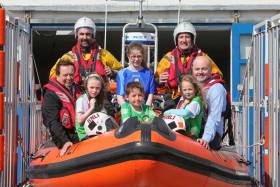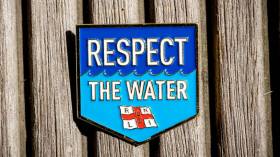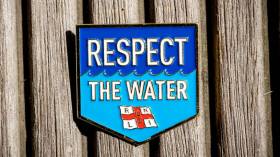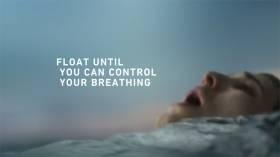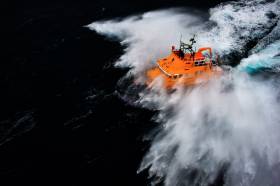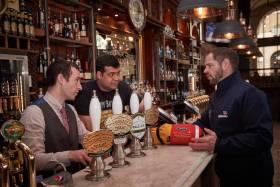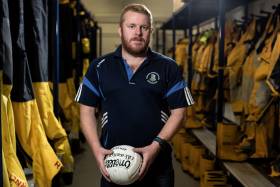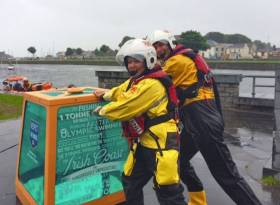Displaying items by tag: Respect The Water
GAA Personalities Back RNLI’s ‘Respect The Water’ Campaign
GAA presenter and commentator Marty Morrissey and hurling legend Anthony Daly joined the lifeboat crew from Kilrush RNLI and young players from Co Clare to raise awareness of the risks of drowning and encourage people to enjoy the water safely.
Ireland’s ‘Respect the Water’ campaign is part of a joint-partnership between the RNLI and the GAA, and involves RNLI volunteer ambassadors visiting GAA clubs around the country to give water safety advice to young people and to raise awareness of the risks of drowning.
Thirty-seven RNLI volunteers have delivered over 100 talks as part of the partnership, with more due to take place during the summer months.
To promote this year’s campaign, Marty Morrissey and Anthony Daly joined young players from Killimer GAA, Kilrush Shamrocks, Kilrush Ladies Football Club, Kilkee Football Club, Kilkee Bealaha GAA, West Clare Gaels and O’Currys GAA.
Both men had very personal reasons for backing the partnership and becoming ambassadors for it.
I am from a fishing village so well aware of the dangers of the sea
Marty Morrissey’s home place is in the picturesque fishing village of Quilty in West Clare on the Wild Atlantic Way, where the sea has always been part of everybody’s life.
As a result, Marty loves the water but is also aware of its dangers and although he attempted to learn how to swim as a child, he never quite got over his fear.
This was re-enforced in recent months when he was filming a survival sequence in the recent TV hit Marty and Bernard’s Big Adventure when they had to enter a lake and that old fear returned. He has promised himself to learn how to swim when this season’s GAA Championship is over.
Speaking at the launch, he said: “When I was young boy growing up in Quilty, my bedroom literally looked out onto the Atlantic Ocean. I remember that every 13 seconds the light from the lighthouse on the Aran Islands shone in my window.
“I would paddle in the water and some of my friends would jump into the water back at the pier in Seafield, but I wouldn’t, I had the fear. I want to get over that and I’ve set myself the challenge to learn properly.
“It is so important because after all, we all live on the island of Ireland and water plays such an important part of our lives. I am from a fishing village so well aware of the dangers of the sea.”
Speaking on the importance of the partnership, he continued: “I think the RNLI and the GAA are interlinked in many ways. They are both about community. I love the water and I respect it. If we can get more people enjoying it safely and raising awareness so that no family have to go through the pain of losing a loved one, then I see that as a win.
“We’ve had too many tragedies in this country. I’m looking forward to the day that I can go for swim and enjoy the water.”
I think there is an awareness of water safety, but we can never stop banging the drum
Anthony Daly has a very personal reason for wanting to promote the partnership. He lost a good friend, Michael ‘Fondi’ Scanlan, to drowning many years ago.
Fondi was a long-standing kit man at his beloved Clarecastle GAA club and drowned while out fishing. Speaking about the tragedy, Anthony said: “Everyone knew and loved Fondi. He was from a big family where I grew up. He was a great GAA man and came from a strong fishing background.
“When word came to the village that Fondi was lost, there was a rush to the quay to help. We spent the week walking the banks and we wouldn’t go to training while the search was ongoing.
“He was found the following Sunday at the River Fergus and while it was a blessing for the family, his loss has been deeply felt by everyone who knew him.”
Anthony swims in the sea every week and has made sure his daughters can swim. Commenting on the campaign, he said: “The RNLI is a great organisation for the GAA to be involved with in local communities. I think there is an awareness of water safety, but we can never stop banging the drum.
“I love the water and I want my daughters to love the water, too, and not fear it. Anything we can do to raise awareness of the risks of drowning and to share water safety advice, can only be a good thing.”
The key message of the RNLI’s ‘Respect the Water’ campaign is to Float To Live if you find yourself in trouble in cold water:
- Fight your instinct to swim hard or thrash about – this can lead to breathing in water and drowning
- Instead, relax and float on your back, until you have regained control of your breathing
- The recommended floating position is to lean back in the water and keep your nose and mouth clear and extend your arms and legs
- If you find it difficult to float then make gentle motions such as sculling with your hands and feet and concentrate on bringing your breathing under control
The RNLI will be present at Croke Park on Sunday 28 July to promote the Respect the Water campaign during the All-Ireland hurling semi-final and to share water safety advice with the thousands of fans travelling to see the match.
Volunteers from RNLI lifeboat stations around Ireland will be on the pitch at half time to share the Float To Live message. The campaign is running throughout the summer with advertising across cinema, outdoor posters, radio, online, and catch-up TV channels.
For more advice on how to float and other water safety advice visit RespectTheWater.com
Following a number of tragic deaths during the past week in the waters around the UK and Ireland, the RNLI is urging people to take extra care if they are heading to the coast or inland waterways this weekend.
As the hot weather continues, risks like cold water shock can put even strong swimmers in danger.
Last weekend saw a number of people lose their lives as they enjoyed the warm weather around the coast and at inland waterways — including a 14-year-old girl who got into difficulty swimming off a Co Louth beach.
In total, RNLI lifeboat crew volunteers were called out to 149 incidents in one of the hottest weekends so far this year.
RNLI beach lifeguards were also busy during the hot weather, patrolling 243 beaches around the UK.
The charity, which relies on public donations, is encouraging anyone visiting the coast to head to a lifeguarded beach and to swim between the red and yellow flags, which is the area most closely monitored by the lifeguards.
Lifeguarded beaches provide much greater safety for general beach users, swimmers and water sports enthusiasts.
Around 150 people die in UK and Irish waters each year, and over half never even planned to enter the water.
Sudden immersion in cold water – especially at this time of year when air temperatures are warm but water temperatures are still very cold – can result in cold water shock, which can be fatal.
RNLI lifeboat crew volunteers were called out to 149 incidents in one of the hottest weekends so far this year
Respect the Water is the RNLI’s drowning prevention campaign. It highlights the risks, advises how to avoid danger and increases the chances of survival in an emergency situation.
RNLI community safety manager Ross Macleod said: “Cold water shock is a very real and present risk for people trying to cool off in open water at the moment, and relevant both around the coast and for inland lakes, reservoirs and rivers.
“Cold water shock is a reaction that, when entering cold water suddenly, can cause someone to uncontrollably gasp and breathe in water. This is particularly dangerous at the moment because water temperatures are still very cold at around 12C, despite air temperatures being much warmer.
“If you plan to go into the water, enter slowly to let your body acclimatise rather than jumping straight in as this will reduce the severity of your cold shock response. If you are taking part in water sports, wearing a wetsuit will also help and, no matter what you are doing, always carry a means of calling for help.
“If you find yourself in trouble in cold water, your natural reaction can be to panic and thrash around, which increases the chances of breathing in water and drowning.
“The best thing to do in this situation is to float on your back and wait for the effects of cold water shock to pass, keeping your airway clear until you can control your breathing. You can then plan your next move to reach safety.
“If you see someone in difficulty, don’t enter the water yourself as you could end up in trouble. Dial 999 or 112 and ask for the coastguard.”
Youghal RNLI is encouraging people to respect the water and heed key water safety messages ahead of summer.
The East Cork lifeboat station’s community safety team will be running a number of events throughout the summer and are inviting individuals and groups to get in touch if they would like the team to speak to them.
Mick Walsh, Youghal RNLI’s volunteer community safety officer, said while the RNLI wants people to have a fun and enjoyable summer, the charity also wants people to do that with safety in mind.
“Whether you are a swimmer, a watersports enthusiast, an angler, a boater or just enjoy walking on the beach, it is important for you to understand that there are risks involved with all water and water-side activities.
“It doesn’t matter what your activity might be, or how many times you’ve done it, accidents can happen.
“Part of our role is to help educate and share our knowledge with the public. We want to talk to people, to help them understand the risks better and to listen to their experiences.”
Walsh said the RNLI has lots of safety advice on how to respect the water.
“Most people who end up in trouble at the coast didn’t intend being in the water so it’s important to know what do to if you do get into difficulty and end up in cold water.
“The RNLI’s national drowning prevention campaign is called Respect the Water and lots of information can be found on the dedicated site www.RespectTheWater.com, including how to float should you get into difficulty.
“We want people to learn and remember simple messages such as how to call for help. Dial 999 or 112 and ask for the coastguard if you or someone you see is in trouble.
“We can help people choose the best communication device for their activity. We also want people to wear a lifejacket or floatation device when on the water.
“Again we can help you choose the right PFD for your activity. We will also show you how to take care of your PFD properly.”
To get in touch with Youghal RNLI’s community safety team, contact Mick Walsh at [email protected].
You can also keep an eye on Youghal RNLI’s Facebook page for more information detailing the RNLI’s Respect the Water campaign, which launches later this month, and to find out when the community safety team is active.
RNLI Brings Drowning Prevention Message To Croke Park For Today’s All Ireland Semi-Final
#WaterSafety - RNLI volunteers from lifeboat stations across Ireland will be taking to the pitch in Croke Park this afternoon (Sunday 12 August) for the All-Ireland Senior Championship Football Semi-Final to share the ‘Float to Live’ message.
The charity is working with the GAA to share drowning prevention advice with their clubs around the country with the aim of saving lives.
The RNLI’s drowning prevention campaign ‘Respect the Water’ is being supported by the GAA’s Healthy Clubs programme. On the pitch later today, RNLI volunteers will unfurl two giant flags for ‘Respect the Water’ and ‘Float to Live’ to highlight the campaign and give people a single survival skill in the water: floating.
The display will be accompanied by the 30-second ‘Float to Live’ video and a halftime interview with the RNLI, featuring comedian, broadcaster — and Dun Laoghaire RNLI lifeboat volunteer — PJ Gallagher.
Volunteer ambassadors have been recruited and trained from RNLI lifeboat stations to deliver short talks and demonstrations to GAA clubs in their local communities so that young men and women can understand the risks of drowning and how a simple action could save a life. The ambassadors are RNLI volunteers who are also passionate about GAA and include, players, coaches, referees and supporters.
‘Float to Live’ is the key safety message of the ‘Respect the Water’ campaign. Even the strongest swimmers can be caught out by the power of the water. The survival message is to fight your instinct to panic, and instead stay calm and float until you can control your breathing. Then a decision can be taken on the next step, to shout for help or try and swim to safety.
The senior football semi-final features two land-locked counties but the RNLI says it is delighted to have the opportunity to share its safety messages with an audience that may not be traditionally associated with lifeboats. The charity adds that the advice applies to everyone whether on the coast or enjoying inland waters and loughs.
“We are extremely grateful to the GAA for giving us the opportunity to highlight the work our two organisations are doing together to try and raise awareness of the risks of drowning and what action to take that could save a life,” said RNLI head of community engagement Gareth Morrison.
“We are looking forward to visiting many more clubs in the weeks and months ahead to share the message.”
PJ Gallagher added: “I know it might come as a surprise to some but I am an RNLI volunteer lifeboat crew member. It will also be less of a surprise to many that I am a passionate and dedicated GAA supporter.
“Being on the pitch during an All-Ireland semi-final is a bit of a dream come true and I’m delighted that it is for such an incredible partnership. I just hope the message will help save lives and I’d encourage everyone to talk about it and share it.”
To find out more about the campaign, visit RespectTheWater.com.
#WaterSafety - The Irish Coast Guard and the RNLI have issued a joint safety message for the festive season to remind people to stay safe when they are in or near the water, and to remember some basic safety advice to use if they see someone in trouble or get into difficulty themselves.
Speaking ahead of the holiday period, Irish Coast Guard operations manager Gerard O’Flynn said: “Many people will be engaging in outdoor activities along the coastline. The simple safety message is: Stay Back, Stay High, Stay Dry.
“Christmas Day swims are a popular pursuit and we would urge the public to only participate in organised swims where medical support and lifeguards are available.
The three Rescue Co-ordination Centres based in Malin, Valentia and Dublin, along with the coastguard helicopter service and volunteer units, will remain operational over the holiday period.
“And we would remind the public that if you see anybody in danger at sea, on the coast or on cliffs to call 112 and ask for the coastguard,” O’Flynn added.
The RNLI’s volunteer lifeboat crews will also remain on call over the Christmas period “but what would really make them happy is if everyone has a safe Christmas,” said the RNLI’s head of engagement Gareth Morrison.
“At this time of year a lot of people take part in charity swims and the water temperature is a lot lower than in the summer months. The RNLI lifeboat crews launch to a lot of people who never expected to end up in the water when they left the house. Callouts can be to people getting cut off from the tide, to slips or falls while walking near the coastline.
“We run our drowning prevention campaign ‘Respect the Water’ all year round and ask people to follow some simple advice and know what to do in an emergency. Further information is also available at www.respecthewater.com.”
If you fall into cold water unexpectedly, remember to fight your instincts, not the water.
People follow the same instinct when in cold water - they gasp, thrash about and swim hard. But this increases chances of water entering your lungs and increases strain on your heart.
If this happens, fight your instinct and float. The initial shock will pass quite quickly within 60–90 seconds and when you have regained control of your breathing, you can then try swimming to safety or calling for help. You’ll have a far better chance of staying alive.
If taking part in a swim, always take your time to slowly walk into the sea to allow your body time to acclimatise. Stay in the shallow water when you first go in to reduce the severity of cold water shock.
If you see someone in trouble in the water, fight the instinct to go in yourself. Call 999 or 112 and ask for the coastguard.
If out for a walk by the water or along the coast, remember:
- Be wary of all edges around the sea and waterside. Slips and falls happen in all locations; it is not just high cliff edges that are a risk.
- Always let someone know where you are going and when you expect to be back.
- Take care when walking in dark and slippery conditions.
- Always take a means of calling for help.
- Always check the weather and tides.
#WaterSafety - Pub chain Nicholson’s have shown there are no half measures when it comes to water safety, after pledging the company’s support for the RNLI’s drowning prevention campaign Respect the Water.
The chain’s Crown Liquor Saloon pub on Belfast’s Great Victoria Street is getting behind the initiative that aims to raise awareness of the potential risks of being on or near water, and equip people with the skills and knowledge to keep themselves and others safe when in or near water.
Every year around 190 people drown around the coasts of the UK and Ireland. Often they have travelled from inland areas to the coast, and many of them never even intended to be in the water but accidentally slipped or tripped.
The Crown Liquor Saloon is one of more than 70 Nicholson’s pubs involved in the partnership with the RNLI. They will promote water safety messages to customers this summer via special promotions of their fish dishes, empowering staff with water safety advice to share with customers, and running additional fundraising and awareness activities.
Throughout the six-week partnership, Nicholson’s aims to raise £28,000 for the RNLI, which remains an independent charity reliant on voluntary contributions.
“At Nicholson’s we place great emphasis on the safety of our customers, but supporting the RNLI gives us an opportunity to go beyond our customers and hopefully educate a wider audience about the potential dangers of water,” said Annette Middleton, marketing manager for Mitchells and Butlers, the parent company for Nicholson’s.
The RNLI’s Respect the Water campaign aims to educate people in Belfast and across Northern Ireland about the potential dangers of water, particularly at this time of year when temperatures rise and many head to the coast to go afloat or visit beaches.
While the charity’s lifeboats and lifeguards are on hand to carry our rescues, Respect the Water aims to prevent people getting into difficulty in the first place.
Ross MacLeod, coastal safety manager for the RNLI, said: “Through our Respect the Water campaign we’re trying to change people’s behaviours to make them think about safety and take steps to safeguard themselves and others.
“It goes without saying our lifeboats will always launch to someone who is in distress - as a search and rescue organisation that will never change.
“But the phrase ‘prevention is better than cure’ rings true, and it is fantastic that such a popular chain as Nicholson’s has agreed to support us in spreading those safety messages.”
Some examples of campaign advice the Belfast pub staff will be helping to spread include:
- Around 190 people die at the UK and Irish coast each year. Half never planned to enter the water.
- British and Irish waters are cold enough year-round to trigger cold water shock.
- People who fall into cold water follow the same instinct, to gasp, thrash about and swim hard. But this is the worst thing to do – it increases chances of water entering your lungs and increases strain on your heart.
- If you fall into cold water, fight your instinct to swim hard. Instead just float until you can regain control of your breathing before then trying to swim to safety or call for help. You’ll have a far better chance of staying alive.
- If you see someone else in trouble in the water, fight the instinct to go in yourself. Call 999 or 112 and ask for the coastguard.
Respect the Water is at the heart of the charity’s drowning prevention work, helping achieve the RNLI’s goal to halve the number of accidental coastal deaths by 2024.
#RespectTheWater - As temperatures look set to soar across Ireland, new research commissioned by the RNLI reveals that more than a third of Irish people would follow their instincts and fight against the water if they unexpectedly fell into it.
The RNLI’s Respect the Water campaign is asking people to fight those instincts and remember one simple piece of advice – floating – that could save lives from drowning.
Sudden immersion in cold water puts people at severe risk of suffering cold water shock, which triggers the instinctive but life-threatening reaction to gasp uncontrollably and swim hard, which can quickly lead to drowning.
Research commissioned by the RNLI shows 39% of people in Ireland would follow this potentially life-threatening instinct if they fell into water, with 28% of respondents saying their immediate reaction would be to swim, while 3% said they would panic – two of the instinctive responses the RNLI is urging people to fight.
Others said they would remove clothing (5%); do nothing (1%); hold their breath (1%), and 1% said they would not know what to do. Only 8% of respondents knew specifically to float (4%) or tread water (4%).
The RNLI recently announced a partnership with the GAA for the Respect the Water campaign, which is being supported through their Healthy Clubs programme.
The charity invited some of the GAA’s top athletes and healthy club representatives to their training college in Poole and to Portsmouth University to experience the effect of cold water on the body.
One of those who attended was Noel Browne, Castlehaven GAA’s Healthy Clubs representative and well-known long-distance open water swimmer.
Noel has recently returned from swimming from the Gibraltar Straits, a major open water swim which he completed in five hours and 40 minutes.
Backing the RNLI’s Respect the Water campaign, Noel said: “It can go against everything your body wants to do but resisting the urge to fight against the water when you fall in and just float, can save your life.
“I train hard for my swims and spend hours in the water all year round. I’ve seen the effects of cold water shock on people who were not acclimatised to the water and it can be frightening and overwhelming. Fighting against it increases the chances of water entering the lungs and puts a strain on your heart.
“The best course of action is to try to float or rest, just for a short time. The effects of cold water shock will pass within 60 to 90 seconds and let you regain control of your breathing, increasing your chances of survival.
“The recommended floating position is to lean back in the water and keep your airway clear. Keeping calm will help maintain buoyancy and moving as little as possible until you have control of your breathing will give you a much better chance of surviving until you can swim to safety, call for help, or continue to float until help arrives.”
RNLI lifesaving manager Gareth Morrison added: “The RNLI’s volunteer lifeboat crews launch to hundreds of calls for help every year in Ireland but, sadly, not everyone can be reached in time. If people are in danger in the water they can help themselves by floating and regaining control of their breathing.
“Through our Respect the Water campaign in partnership with the GAA, we want to start a national conversation about water safety. We’re asking people to remember this lifesaving advice and share it with others – it could be the difference between life and death. Each year an average of 28 people drown accidentally around the Irish coast.
“For those who are planning to go into the water and with the good weather coming out way, the best way to stay safe is to choose a lifeguarded beach and swim between the flags. And if you see someone in danger in the water, call 999 or 112 and ask for the coastguard.”
The Respect the Water campaign will run throughout the summer on channels including cinema, outdoor, radio, online, and on catch-up TV channels. The cinema adverts are voiced by Irish actor Liam Cunningham.
Visit RNLI.org/RespectTheWater for information on the effects of cold water shock and floating techniques.
#RespectTheWater - The RNLI has placed a tonne of water in Galway and Dun Laoghaire respectively for the summer months in a bid to show visitors and locals alike the power of the water, river and sea.
The tonnes of water, which will be located at the Spanish Arch in Galway and Dun Laoghaire's East Pier until the end of August, forms part of the RNLI’s Respect The Water campaign.
Each tonne is printed with important advice about the power of water, such as how fast a rip current can flow. They will also demonstrate to people how heavy a relatively small volume of water is – one cubic metre of water weighs one tonne.
They were created to be a visual and engaging way of delivering this message that no matter how strong a swimmer you might be, you are no match for the power of the water.
Last month the RNLI launched its annual national drowning prevention campaign, Respect The Water, and this year the charity is warning the public to watch out for key dangers that can catch people out in or near water.



























